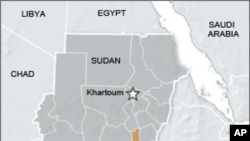The United States says Sudan and South Sudan want to find a way to avoid "all-out war," following violence across their border. The two countries have been unable to resolve disputes over borders, oil and citizenship issues stemming from the south's independence last July.
After talks with officials from both governments, U.S. Special Envoy for Sudan Princeton Lyman says the two sides realize how close they are to a resumption of full-scale war, and how costly that would be.
"In the discussions I have had in both Khartoum and Juba, I can say with confidence that virtually everyone I have talked to has said, 'Look, we don't want to go to all-out war with the other. We need to find a way out,'" said Lyman.
But Lyman says there remain serious disagreements about what is needed to end the conflict.
"It's not going to be easy," he said. "Emotions are running very, very high. But I think the bottom line here, the basic line is that both countries are arguing about security."
Months of hostility over oil pipeline and port fees peaked last week when South Sudan fighters took control of the key oil town of Heglig.
Speaking to reporters by telephone from Khartoum, Lyman says South Sudan was surprised by international condemnation of its move because officials in Juba maintain they have always claimed Heglig. Lyman says that was not apparent in the Comprehensive Peace Agreement that ended 21 years of fighting and led to southern independence.
"So people did assume, as we did, that there was at least, if not an officially-recognized-by-both-sides border, there was a border which was crossed," he said. "They don't see it that way. But the point - and they have now acknowledged this - [is] that you don't settle disputed border areas by occupying them."
Before withdrawing from Heglig, Lyman says South Sudan wants assurances that there will be no more attacks by Sudanese-backed militias or Sudanese bombing raids as well as the withdrawal of northern troops from the town of Abyei.
Lyman says Khartoum's patience over the occupation of Heglig appears to be growing thin, with President Omar al-Bashir's vow on Thursday to teach the south "a lesson by force."
Part of the instability along the border is continuing violence in the provinces of Southern Kordofan and Blue Nile, where many people fought alongside the south for independence from Khartoum, but remain part of Sudan.
"Across that border, there has been support for proxies and there is spillover from the Southern Kordofan/Blue Nile wars," said Lyman. "And that is creating a series of clashes and conflicts across the border as each tries to secure its own interests as they see them along that border."
Humanitarian officials say widespread hunger in Southern Kordofan and Blue Nile is worsening. The African Union, Arab League and United Nations have a joint proposal to allow aid shipments to the region.
Lyman says Khartoum agrees in principle to the plan, and that he is pushing hard to overcome remaining questions about how parts of the proposal would be carried out.
"I am also hoping that with the announcement of a humanitarian program, we will also almost by default get a cessation of hostilities in that area, and that hopefully creates a better atmosphere for peace," he said.
Lyman says international mediators are working with both governments to return to a previously agreed on demilitarized and monitored 20-kilometer buffer zone to settle on a final border between them.
News
US: Sudan and South Sudan Want to Avoid 'All-Out War'




